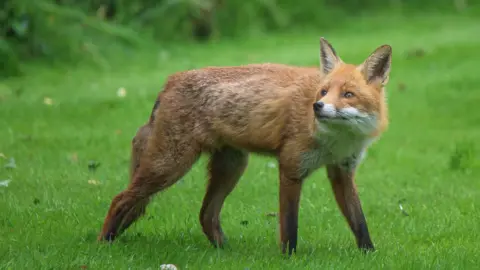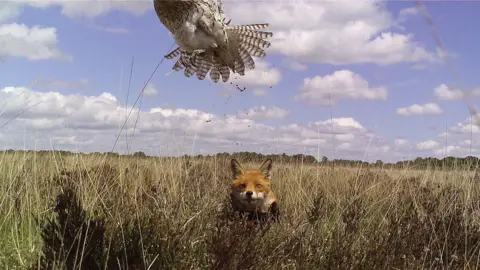Food waste keeping fox population high, study says
 Getty Images/Leonora Oates
Getty Images/Leonora OatesFoxes eating people's waste food are likely to be keeping their population artificially high in the New Forest, a study has found.
Scientists analysed the contents of 447 foxes' stomachs and found 14% of their diets was made up of human food sources.
The work by the Game and Wildlife Conservation Trust (GWCT) and Bournemouth University found cutting food waste and better rubbish management could help manage the fox population better.
That would in-turn ease pressure on the population of wild birds, which are hunted by foxes.
Curlews, lapwings, oystercatchers and ringed plovers are all birds of conservation concern, according to the British Trust for Ornithology, and their national populations have declined by between 24% and 48% since 1995.
"We found a wide range of human food items in fox stomachs and the remnants of plastic bin bags," GWCT post-doctoral research scientist Nathan Williams said, whose PhD was in collaboration with Bournemouth University.
 Elli Rivers
Elli Rivers"Human food was more likely to be found in fox stomachs that were sampled close to built-up areas and the amount detected was consistent throughout the year, not just during the holiday seasons.
"This is likely to be a result of food waste being left unsecured by the outdated waste disposal system, and possibly people deliberately feeding foxes."
Forestry England keepers helped the GWCT by making records of its work available.
"We are happy to be aiding scientific research which helps our understanding of prey and predator relationships, particularly with regard to species that are in severe decline nationally," Andy Page, Forestry England's head of wildlife management, said.
"Hopefully this will enable targeted and sustainable efforts to improve populations of threatened species. This recent work is highlighting that we can all play a part in maintaining the New Forest as a special place for wildlife."
New Forest residents will switch to using wheelie bins for their rubbish as part of a switch-over which will be introduced between June and March next year.
You can follow BBC Hampshire & Isle of Wight on Facebook, X, or Instagram.
